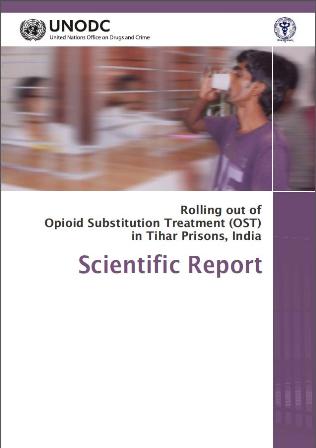India: New study confirms effectiveness of Opioid Substitution Treatment in prison settings

Opioid Substitution Treatment (OST) is a medical treatment under which a person who has become dependent on an illegal opioid such as heroin receives - under medical supervision - a substitution treatment with methadone or buprenorphine. Scientific evidence suggests that substitution treatment can help reduce heroin use, drug-related deaths, related infectious diseases as well as drug-related criminal activities. The treatment also helps to improve the physical, psychological and social well-being of the dependent users. It is particularly crucial to offer OST in prison settings as studies from around the world show that many prisoners have a history of problematic drug use and that drug use, including injecting drug use often occurs in prisons. The prison population is also at high risk of HIV resulting from sharing of needles and unsafe sexual practices and therefore, posing a grave threat to public health.
The study was commissioned by the United Nations Office on Drugs and Crime and conducted by the All India Institute of Medical Sciences (AIIMS), New Delhi in collaboration with Tihar Prisons, New Delhi with the aim to implement and learn about the effectiveness of OST - buprenorphine as long term treatment for opioid dependence in prison settings. A total of 220 opioid dependent inmates participated in the study. After initiating treatment, assessments were done every three months to monitor the inmates and record results. For 95.3 percent of the inmates included in the study, heroin was the primary drug of abuse. 50.3 percent were injecting drug users (IDUs) and among them 70 percent reported that they shared needles. An alarming 97 percent admitted to the fact that the offences for which they had been arrested were done to support their drug habit. Apart from OST, the inmates were also counseled to increase retention, prevent relapse and address high risk behavior.
The results of the study point to 98 percent retention of OST clients in prison settings. A significant reduction was found in the severity of dependence, craving for drugs and withdrawal symptoms. There was also a decrease in high risk behavior including injecting drug use, sharing of needles and unsafe sexual activities. The prison authorities noted a marked improvement in health and personal hygiene among inmates. The drug dependent inmates on OST were calmer, more agreeable to counseling and more productive.
However, the implementation of the programme also faced major challenges such as (i) the unpredictable duration of stay of inmates as an overwhelming majority were pre-trial remand prisoners, (ii) lack of linkage to community programmes upon release and (iii) frequent rotation of staff at the prison requiring frequent and repeated trainings for service providers. These challenges were addressed as part of the programme and necessary action was taken to over-come them.
Based on the findings of the study, the report made the following recommendations:
(i) To scale up OST in prison sites across India and mainstream it under the National AIDS Control Programme to maximize coverage and treatment.
(ii) To standardize provisions of psychosocial care for better results.
(iii) To develop post release models of care to ensure continuity of treatment through OST treatment centres available in the community.

This study was conducted under the UNODC, project titled, Prevention of Spread of HIV amongst Vulnerable Groups in South Asia with funding from SIDA - Swedish International Development Cooperation Agency.

